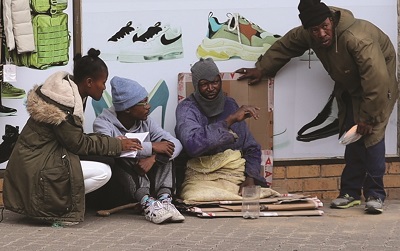Personal Perspectives and Coping Strategies
By Relebohile Mosuoe, Leseli Mahloane and Keabetsoe Malikhetla
MASERU – Peer pressure is a pervasive phenomenon that impacts individuals of all ages and backgrounds. It refers to the influence exerted by peers or social groups to conform to their norms, behaviors, or expectations. While some individuals may succumb to negative peer pressure, others manage to resist it and make independent choices. In this article, we explore the experiences of Ntipase Masunyane and Mosioa Makebetlane, who offer contrasting perspectives on peer pressure. Additionally, we delve into effective coping strategies to navigate peer pressure situations.
Ntipase Masunyane’s Experience
Ntipase Masunyane candidly acknowledges that he has succumbed to peer pressure in the past, particularly when it involved spending money on alcohol. However, he emphasizes that he has since developed self-control and confidence, enabling him to resist negative influences. Masunyane highlights the importance of personal perspective, asserting that individuals have the power to determine how they perceive and respond to peer pressure. He firmly believes in saying “no” unless there is a tangible benefit that aligns with his personal goals and values.
Diverse Responses to Peer Pressure
Masunyane’s perspective underscores the inherent individuality within human nature. People’s reactions to peer pressure can vary significantly based on their unique experiences, personalities, and values. While some individuals like Masunyane may develop resilience and the ability to resist negative influences, others may find it more challenging. It is crucial to recognize and respect these differences, understanding that individuals have their own journey when it comes to managing peer pressure.
Parental Influence
Masunyane suggests that parents can contribute to the challenges of peer pressure by imposing their expectations and influencing decisions. He believes that, as adults, individuals should have the autonomy to make their own choices, free from excessive parental intervention. While parental guidance is essential, striking a balance between guidance and allowing personal autonomy can help individuals develop their decision-making skills and assert their independence effectively.
Mosioa Makebetlane’s Perspective
Mosioa Makebetlane presents an alternative viewpoint, asserting that he has never experienced peer pressure due to his resilience, strength, and his role as a traditional doctor. As a herbalist and licensed traditional doctor, Makebetlane claims to possess the knowledge and techniques to offer support and guidance to those struggling with peer pressure. He asserts that his services are available at Koro-koro Ha Mofoka every Sunday and claims to have a remedy for every problem.
Coping Strategies 1. Building self-confidence: Developing a strong sense of self-worth and confidence can help individuals resist negative influences. By understanding and valuing their own beliefs, interests, and goals, individuals can make choices aligned with their values, reducing the likelihood of succumbing to peer pressure.
2. Seeking support: Establishing a supportive network of friends, family, or mentors can be instrumental in managing peer pressure. Trusted individuals can provide guidance, advice, and a non-judgmental space to discuss concerns or difficult situations.
3. Setting boundaries: Establishing personal boundaries and knowing one’s limits can be essential in resisting peer pressure. Clearly communicating these boundaries to peers can help individuals assert themselves and make informed decisions that prioritize their well-being.
4. Developing critical thinking skills: Encouraging individuals to think critically and question societal norms can empower them to make independent choices. By evaluating the potential consequences of their actions and considering alternative perspectives, individuals can make decisions that align with their values rather than succumbing to external pressures.
Peer pressure is a complex phenomenon that affects individuals in various ways. Ntipase Masunyane and Mosioa Makebetlane provide contrasting perspectives, illustrating the diversity of experiences and coping mechanisms when faced with peer pressure by fostering self.


